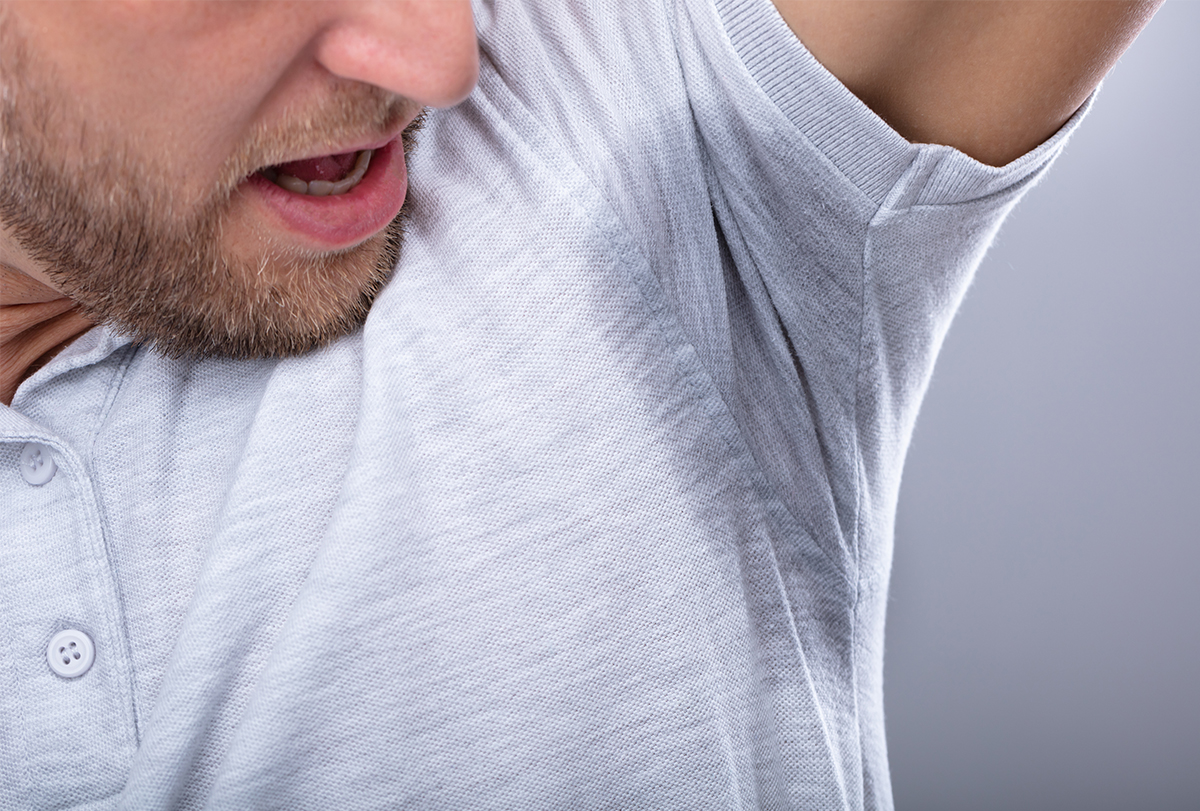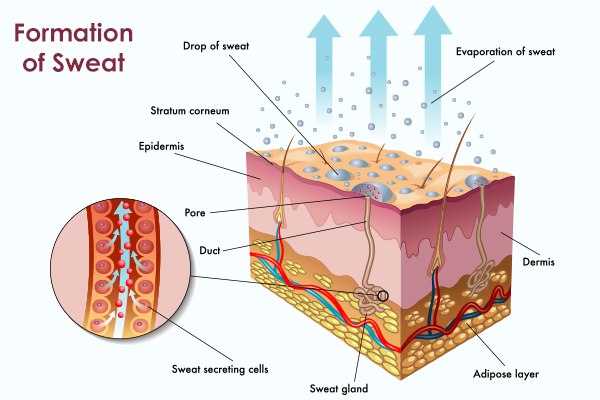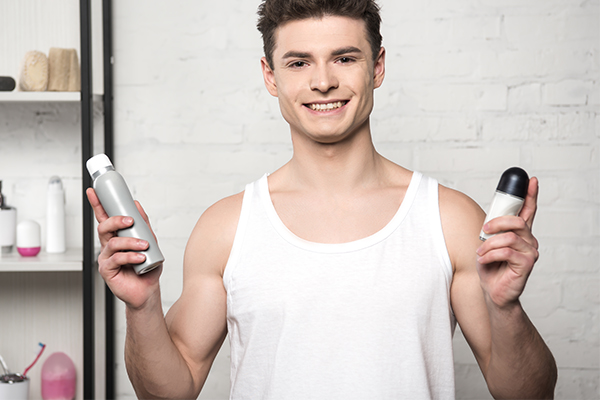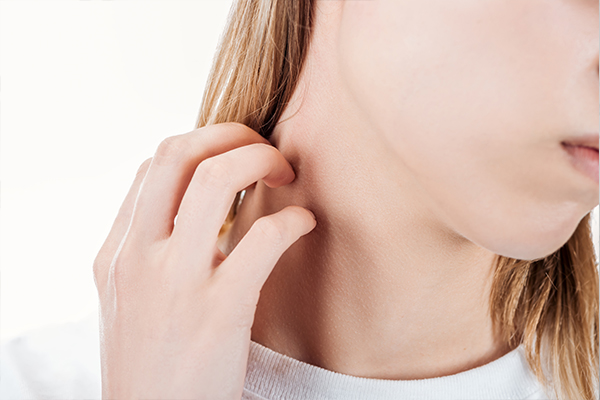In this article:
Hyperhidrosis refers to the production of excessive sweat due to an oversensitive sympathetic nerve that causes uncontrollable sweating despite the number of sweat glands being the same as other people.

While everyone sweats in hot weather and during exercise to cool down, people with hyperhidrosis may perspire regardless of these conditions. This medical condition can also lower a person’s self-esteem and bring about feelings of social isolation, ultimately affecting their daily life and activities.
How Common Is Hyperhidrosis?
Hyperhidrosis affects around 3% of the total US population, often posing significant psychological and emotional implications. (1) While primary hyperhidrosis generally starts in childhood or puberty, it can develop at any age. (2)
Types of Hyperhidrosis

Excessive sweating, or hyperhidrosis, is classified into the following two types:
1. Primary hyperhidrosis
This kind of excessive sweating is a medical condition in itself, characterized by sweating in specific areas of the body, such as the hands, feet, face, head, and underarms. It is also important to note that the sweating is “symmetric,” which means it affects both sides of the body equally.
2. Secondary generalized hyperhidrosis
It is not a medical condition by itself but is caused by an underlying problem or as a side effect of some medications. Secondary hyperhidrosis affects larger areas of the body.
Causes of Excessive Sweating (Hyperhidrosis)
The causes of primary and secondary hyperhidrosis are widely different. While primary hyperhidrosis is hereditary, the sweating may be triggered by:
- Hot weather
- Fever
- Anxiety
- Intake of spicy foods
- Exercise
On the other hand, secondary hyperhidrosis may occur due to the following medical conditions or drugs:
- Acromegaly
- Carcinoid syndrome
- Cancer or tumor
- Anxiety disorders
- Glucose control disorders (3)
- Obesity (3)
- Menopause (3)
- Hyperthyroidism
- Cardiovascular problems
- Respiratory problems
- Nervous system disorders
- Alcohol or caffeine
- Corticosteroids
- Tricyclic antidepressants
- Cholinesterase inhibitors
- Nicotinamide
- Opioids
- Selective serotonin reuptake inhibitors
Symptoms of Hyperhidrosis
The following signs and symptoms of hyperhidrosis can help differentiate normal sweating from hyperhidrosis:
- Sweating that soaks your cloth and is visible on the skin as drips or beads, without any apparent reason
- Difficulty holding or gripping pens and other objects due to sweaty hands
- Prolonged wetness of the skin, which causes the skin to turn white and soft, ultimately peeling
- Skin infections
- Frequently sweaty feet, palms, or underarms
- Sweating on the groin, scalp, face, and under the breasts
Medical Treatment for Excessive Sweating (Hyperhidrosis)

The medical treatment for hyperhidrosis is determined based on the underlying cause, often using the following interventions to address the problem:
1. Prescription-strength antiperspirants
These antiperspirants often contain aluminum chloride (4) and are to be applied before bedtime to enable washing off in the morning. Since they may cause skin and eye irritation, use these products only when prescribed by your doctor.
2. Clinical-grade cloth wipes
Your doctor may prescribe glycopyrronium tosylate contagion cloth wipes that can help control armpit sweating when used regularly.
3. Iontophoresis
This technique involves passing of electric current to the affected area, through a fluid, several times a week until the sweating reduces. The therapy sessions are then lowered to once a week or as advised.
4. Botox injections (botulinum toxin)
Injecting Botox around the sweat glands can help inhibit the production of sweat for a few months. This works by paralyzing the neuromuscular junction of sweat glands. (1) However, the injections are costly and may cause pain, and the treatment needs to be repeated every few months.
5. Microwave destruction
This method involves numbing the affected area, followed by heating the sweat glands with microwave energy. The treatment is repeated a few times until the glands are completely destroyed.
6. Oral medications
Anticholinergic medications can also help reduce sweating. (4) However, the use of anticholinergics for hyperhidrosis is not approved by the FDA. Moreover, they have various side effects such as constipation, altered taste, dry mouth, blurred vision, and heart palpitations.
7. Surgery
You can also opt for endoscopic thoracic sympathectomy (ETS), which refers to the removal of nerves that stimulate excessive sweating. (5) This surgery is only performed if other treatments fail to control the sweating.
Diagnosing Hyperhidrosis
Diagnosis of hyperhidrosis primarily requires a family history and physical exam, including close inspection of the affected areas of the body. Additionally, the doctor may prescribe some tests such as:
- Starch-iodine test to help determine the areas of excessive sweat
- Paper test to estimate the amount of sweating
- Blood tests to help identify the underlying medical cause
Complications of Excessive Sweating (Hyperhidrosis)

If left untreated, hyperhidrosis can increase the risk of the following complications:
- Nail infections generally in the toenails
- Warts caused by HPV
- Bacterial infections, primarily in the hair follicles and between the toes
- Heat rash, due to trapping of perspiration under the skin, causing a red, itchy, skin rash
- Psychological impact, such as anxiety, low self-confidence, social withdrawal, emotional stress, and depression
When to See a Doctor
It is vital to immediately contact a doctor if the sweating:
- Occurs without any apparent reason
- Is interfering with your daily activities or sleep routine
- Is a source of emotional stress or social withdrawal
- Is accompanied by chest pain, nausea, or light-headedness
- Increases suddenly
Final Word
It is normal to sweat while doing a strenuous activity, but excessive sweating without any apparent cause can interfere with a person’s way of life.
Various methods can help control sweating, such as the use of antiperspirants, lowering stress, and avoiding triggers. You can also consult your doctor for a suitable therapy, if required, which can offer you a permanent or more long-lasting solution.

- Was this article helpful?
- YES, THANKS!NOT REALLY


